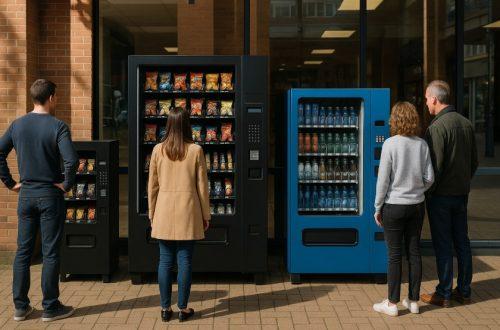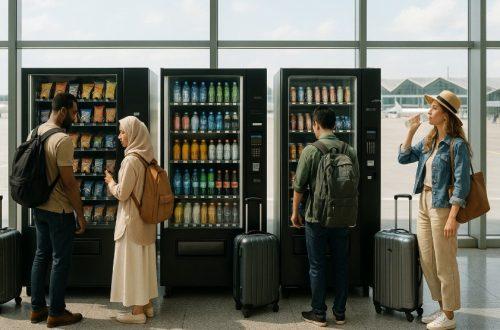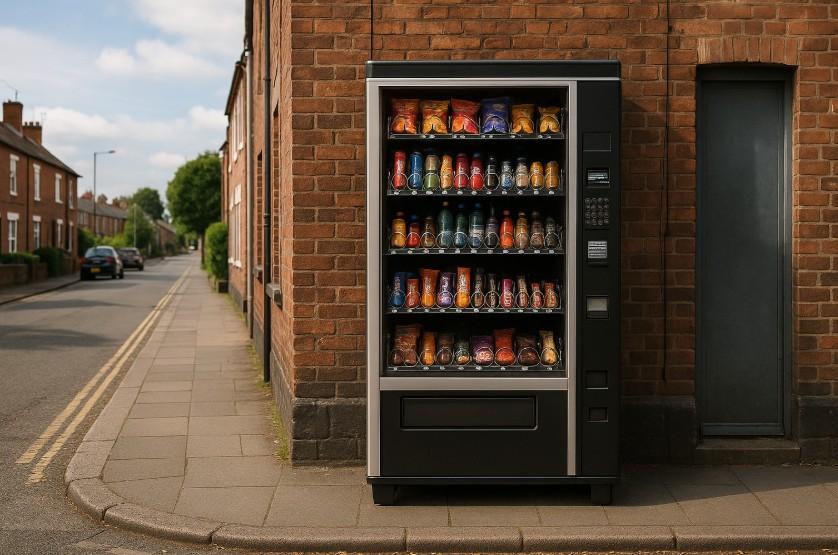|
Getting your Trinity Audio player ready...
|
Have you ever considered starting a vending machine business in the UK but felt confused about the legal side of things? You’re not alone. One of the first questions most newcomers ask is how much is a vending machine permit in the UK?
Understanding the costs and legal requirements can make all the difference in setting up a compliant and profitable operation. Whether you’re planning to place a machine in a gym, office, school or on a high street, the costs and permits required will vary.
With different councils having different rules, knowing what’s expected from you can help avoid penalties or wasted investments.
This guide breaks everything down in simple terms to help you confidently plan your vending journey in 2025 and beyond. Let’s start by understanding what a vending machine permit actually is and why you need one.
What Is a Vending Machine Permit and Why Do You Need One?

In the UK, a vending machine permit is official authorisation from your local council that allows you to place and operate a vending machine in public or certain commercial locations. Without this permission, you could face fines or have your machine removed.
There are several reasons vending machines require permits:
- They may be installed on public property, including pavements and streets.
- They can affect pedestrian access, visibility, and public safety.
- If you’re selling food or drink, you’re required to meet food safety and hygiene standards.
- Public liability also becomes a concern, particularly for hot drink or complex vending machines.
If your vending machine is situated in a private indoor space like a gym or office, you often only need food business registration. But if it’s on public land or even private outdoor retail parks, council permits or commercial agreements are usually required.
Permits help councils manage use of public space while ensuring machines don’t compromise safety, health, or cleanliness. Vending permits are not just about placement, they ensure your operations meet the regulations tied to hygiene, land use, and consumer protection. Without one, you may be running your business illegally.
Understanding this requirement from the beginning can help avoid delays and unnecessary expenses during your setup.
Which Authorities Issue Vending Machine Permits in the UK?
When setting up a vending machine business in the UK, you’ll typically need to interact with several local and national authorities depending on what you’re selling and where you plan to install your machine.
Here’s a breakdown of who you’ll likely deal with:
- Local Council Licensing Teams: Handle street trading consents and site permissions for public land. If you want to place your machine on a pavement or other council-managed land, this is your first stop.
- Environmental Health Department (Council): Required if your vending machine sells food or drinks. This team handles food business registration, inspections, and hygiene compliance.
- Planning Department (Council): In some cases, you might need planning permission or advertising consent, particularly if your machine alters a building’s exterior or includes digital signage.
- HMRC: If your revenue crosses certain thresholds, you’ll need to register for VAT and ensure your business meets tax obligations.
- Landowners or Landlords: For machines placed on private land, such as offices, gyms, or shopping centres, written permission and a location agreement is essential. This often replaces a council permit but may include rent or commission agreements.
Each of these authorities has a specific role to play in keeping your vending business legal and safe. Taking the time to engage with the right departments ensures a smooth setup process and ongoing compliance with UK vending laws.
What Laws Govern Vending Machine Permits in 2025?
Running a vending machine legally in the UK in 2025 means complying with a number of national and local laws. These regulations ensure safety, hygiene and responsible use of public spaces.
The main laws you must follow include:
- Local Government (Miscellaneous Provisions) Act 1982: Governs the use of public spaces for trading. You’ll need permission from your council to place machines on pavements, high streets or parks.
- Food Safety Act 1990: Applies if your machine sells food or beverages. This law ensures hygiene standards are met and includes mandatory food business registration.
- Tobacco and Related Products Regulations: Cigarette vending machines are illegal in the UK since 2011. These laws also prevent vending machines from being used for restricted tobacco products.
- Planning Laws: Machines that alter buildings, include digital displays, or are placed in protected areas might need planning permission or advertising consent.
Failing to comply with these laws can result in fines or the removal of your machine. Additionally, you may be required to meet standards for fire safety, accessibility, and waste disposal depending on your machine type and location.
Understanding the legal framework from the outset can help prevent costly mistakes and interruptions to your vending business.
How Much Is a Vending Machine Permit in the UK?
Permit costs can vary widely based on your location, the machine’s size, type, and whether it’s placed indoors or outdoors. In general, urban councils charge more than smaller or rural ones.
Here’s a breakdown of estimated costs for 2025:
| Location | Indoor Machine Permit | Outdoor Machine Permit | Renewal Fee (Avg.) |
| London Boroughs | £100 – £200 | £800 – £1,500 | 60–70% of initial |
| Manchester | £80 – £150 | £400 – £1,000 | 50–60% of initial |
| Birmingham | £70 – £120 | £350 – £900 | 50–60% of initial |
| Small Towns/Rural | £50 – £100 | £200 – £500 | 50% of initial |
Indoor locations on private land often require no council permits, but food registration is still mandatory. Outdoor machines, especially in busy high streets or transport hubs, face higher permit costs and longer approval times.
Permit renewals are cheaper, usually around half the original fee, but skipping or delaying renewals can lead to fines or enforced removal. Always check with your local council as fees and rules differ by region.
What Factors Affect the Cost of a Vending Machine Permit?

The cost of a vending machine permit in the UK is not fixed. It depends on a number of variables that range from machine complexity to location type. Understanding these factors will help you plan your budget accurately.
Type of Vending Machine
- Snack or cold drink machines are the least expensive to licence due to lower hygiene risks.
- Hot food and coffee machines require more safety checks and carry higher permit costs.
- Machines selling fresh or chilled foods may trigger stricter food safety controls and regular inspections.
- Specialised machines (e.g. for PPE or electronics) may face additional scrutiny.
Ownership and Location of the Property
- Machines on private indoor property (e.g. offices or gyms) often don’t need a council permit. You just need food registration and landlord approval.
- Private outdoor locations like shopping centres may involve a commercial rent or commission instead of a permit.
- Public land (pavements, streets) will require a council-issued street trading consent, which typically carries the highest fees.
Regional Variations
- London and major cities usually charge higher fees due to demand and regulation.
- Rural or small towns are generally more affordable.
Extra Operational Costs
- Expect expenses like electricity supply, annual safety checks, and waste disposal contributions, especially for larger or high-powered machines.
By evaluating each of these factors ahead of time, you can better predict your costs and choose a setup that aligns with your budget.
Do Indoor and Outdoor Vending Machines Require Different Permits?
Yes, there is a clear difference between permit requirements for indoor and outdoor vending machines in the UK. Whether your machine is placed inside a private facility or out on the public street impacts what approvals are needed and what fees apply.
Let’s look at a direct comparison:
| Criteria | Indoor Vending Machines | Outdoor Vending Machines |
| Location Type | Usually on private land | Public land or outdoor private sites |
| Council Permit Needed | Rarely (unless complex cases) | Almost always required |
| Food Registration | Required for food/drink machines | Required for food/drink machines |
| Landowner Permission | Yes (landlord or business owner) | Yes (council and/or private owners) |
| Street Trading Licence | Not needed | Typically mandatory |
| Common Locations | Gyms, offices, hospitals | High streets, transport hubs |
| Setup Time | Faster, fewer legal hurdles | Longer due to permit process |
Indoor machines are a popular choice for beginners due to fewer regulations and lower setup costs. Outdoor machines, while offering more visibility, require additional permits, planning, and investment. Starting indoors can be a smart strategy before expanding into public-facing outdoor locations.
How Do You Apply for a Vending Machine Permit in the UK?

Applying for a vending machine permit involves several steps and varies slightly depending on your council and machine type. Understanding the process helps you prepare your documents and avoid costly delays.
What Is the Step-by-Step Process to Apply for a Vending Machine Permit?
- Start by contacting your local council’s licensing team.
- Complete the street trading licence or site consent application form.
- Submit the required documents and application fee.
- Council conducts internal consultations across departments (licensing, planning, highways, etc.).
- Wait for a decision, typically given within 4 to 8 weeks.
What Documents Do You Need for a Vending Machine Licence Application?
- Proof of business registration (Companies House or sole trader details).
- Valid public liability insurance.
- Food hygiene registration certificate (for food and drink machines).
- Details of the vending machine including dimensions, power usage, and type of products sold.
- Photos or location maps, if required.
How Long Does It Take to Get a Vending Machine Permit Approved?
- Standard approval time: 4 to 8 weeks.
- More complex applications (e.g. machines on busy high streets or large public spaces): 8+ weeks.
- Delays can occur due to missing documents or objections from other departments.
Can You Apply for a Vending Machine Permit Online in the UK?
- Most councils offer online application portals.
- You can upload documents, pay fees, and track the progress of your application.
- Make sure to keep digital copies of receipts and reference numbers for future renewals.
Preparing in advance and checking the requirements of your specific local authority can significantly speed up the application process and ensure success.
What Happens If You Operate Without a Permit?
Running a vending machine without the required permits can lead to serious financial and legal consequences. Councils take unauthorised trading seriously, especially in public areas.
Here’s what could happen:
- Fines: You could face penalties ranging from £500 to £2,500, depending on the location and council regulations.
- Machine removal: Councils can remove or impound your vending machine if it is placed illegally. In most cases, you must pay the removal and storage costs.
- Loss of business opportunity: Confiscation can damage your reputation and make future applications more difficult.
- Appeals: If you believe the decision was unfair, you can appeal to the council, provide evidence, or seek legal advice.
It’s always safer and more cost-effective to go through the official process before placing your machine. Avoiding permits may seem quicker but often leads to greater delays and losses in the long run. Being compliant also protects your customers, especially when selling food or drink products.
Are There Different Permits for Food, Drink, and Tobacco Vending?
Yes, the type of products you sell will determine what permits or approvals you need for your vending machine. Each category comes with its own set of legal obligations.
Here’s how it works:
- Snack and Drink Machines: If you’re selling any consumable goods, you must register as a food business with the local council at least 28 days before trading. Registration is free but non-negotiable. Hygiene standards and regular checks are part of the requirement.
- Hot Food or Coffee Machines: These involve additional safety checks due to heating elements and potential risks. Councils may also inspect power usage, ventilation, and cleaning practices more thoroughly.
- Tobacco Vending Machines: These are banned in the UK since 2011. You cannot legally operate a cigarette vending machine in 2025.
- Alcohol Vending Machines: Selling alcohol through vending machines is not permitted. Alcohol sales require ID verification, which machines cannot provide.
If you plan to sell anything outside snacks or soft drinks, always check with your local authority first to see what additional permits or restrictions may apply.
How Do Vending Machine Permit Costs in the UK Compare Globally?

Understanding how UK vending permit costs compare to other countries can help new operators evaluate whether this market is right for them. While the UK is considered moderately regulated, it still holds some of the strictest hygiene rules in Europe.
Here’s a comparative overview:
| Country | Average Permit Cost | Regulation Strictness | Notable Factors |
| United Kingdom | £200 – £1,500 annually | Moderate to High | Strong hygiene enforcement, council-based fees |
| United States | £50 – £500 (varies by state) | Low to Moderate | Varies by city/state, fewer hygiene rules |
| Germany | £300 – £1,000+ | Very High | Extensive documentation, high safety standards |
| France | £250 – £900 | High | Frequent inspections, regional authority control |
| Italy | £100 – £400 | Low to Moderate | Relaxed for snacks, stricter for perishables |
The UK sits in the middle when it comes to regulation and fees. US permit costs are lower but vary widely by state. EU countries like Germany and France enforce more detailed hygiene standards, especially for fresh foods. Italy tends to have looser rules for dry snacks but tighter controls on drinks and fresh items.
UK vending operators must focus on food safety, registration, and proper placement, making it more compliant-focused than revenue-restrictive.
Can You Save Money on Vending Machine Permits in the UK?
Yes, there are several ways to reduce the cost of running a vending machine business, especially when it comes to obtaining permits. These savings often come from strategic placement, local incentives, and operational planning.
Here’s how you can save:
- Use Private Property: Placing machines in indoor private spaces like gyms, offices, or salons eliminates the need for a street trading licence. You only need landlord consent and food business registration.
- Start Small and Scale: Focus on low-cost indoor permits in small towns or rural areas before expanding into high-fee urban zones.
- Check for Local Business Grants: Some councils offer startup support schemes or discounted rates for small or new businesses entering vending.
- Avoid Public High Streets Initially: These areas often come with the highest permit costs and strictest conditions. Start in less competitive zones to build your experience.
- Tax Deductions: Permit fees, licence renewals, electricity, and even initial machine purchases can be written off as business expenses under UK tax rules.
These savings not only reduce upfront costs but also help build a more sustainable business in the long term.
How Much Does It Cost to Start a Vending Machine Business in the UK?

Setting up a vending machine business involves more than just buying the machine. You’ll need to consider startup, permit, installation, and operating costs to determine your full investment.
Machine Purchase, Permit, Insurance, Stock
- Used vending machines: £800 – £2,000
- New machines: £2,500 – £5,500
- Premium hot food machines: £5,000 – £12,000
- Permit/licence (public land): £0 – £1,500 annually
- Food business registration: Free
- Public liability insurance: £60 – £200 per year
- PAT testing & safety checks: £50 – £100 per machine
- Initial stock: £150 – £400
- Card reader & payment system: £150 – £300
- Installation/delivery: £100 – £300
- Branding/signage: £100 – £400 (optional)
Low, Average, High Startup Cost Breakdown
| Expense Category | Low Estimate | Typical Estimate | High Estimate |
| Machine purchase | £800 | £3,500 | £12,000 |
| Card reader & setup | £150 | £250 | £300 |
| Delivery & installation | £100 | £220 | £350 |
| Council permit/licence | £0 | £500 | £1,500 |
| Food registration | Free | Free | Free |
| Insurance (annual) | £60 | £120 | £200 |
| PAT/safety checks | £50 | £75 | £100 |
| Initial stock | £150 | £280 | £400 |
| Branding/signage | £0 | £200 | £400 |
| Total Startup Cost | £1,310 | £5,145 | £15,250 |
Cover Monthly Running Costs: Electricity, Stock, Repairs, Commission
| Expense Category | Low Estimate | Typical Estimate | High Estimate |
| Electricity | £20 | £40 | £60 |
| Stock replenishment | £200 | £400 | £800 |
| Card transaction fees | £20 | £50 | £100 |
| Site commission/rent | £50 | £150 | £300 |
| Connectivity/telemetry | £5 | £10 | £15 |
| Maintenance/repairs | £10 | £25 | £40 |
| Cleaning/consumables | £5 | £10 | £15 |
| Total Monthly Cost | £310 | £685 | £1,330 |
Starting with one machine on private land allows you to learn the business without heavy regulation or risk. Once you build steady profits, you can expand into public areas or diversify machine types.
Is Owning a Vending Machine Business Profitable in the UK?
Yes, vending machines can be a highly profitable and flexible income stream in the UK if you plan carefully and manage your operations efficiently.
Here’s why:
- Low Overheads: No staff wages, rent, or daily supervision needed.
- Residual Income: Machines operate 24/7, generating passive sales even when you’re not present.
- Flexible Hours: You decide when to restock or perform maintenance.
- Scalable Model: Start with one or two machines and grow your network over time.
- Profit Margins: A well-placed machine can generate £1,000 – £4,000 in annual profit after expenses.
Your success will largely depend on location, product selection, and customer demand. High-traffic areas tend to deliver the best returns. Understanding seasonal trends and keeping machines stocked also influences profitability.
Running a vending business is not completely hands-off but offers a balance between flexibility and earnings potential that appeals to both full-time entrepreneurs and side hustlers.
Conclusion
So, how much is a vending machine permit in the UK in 2025? The answer depends on your machine type, location, and whether you’re operating indoors or outdoors.
While permits in London can reach over £1,000 annually, smaller towns offer more affordable options starting at around £50. Choosing private property can help you avoid costly street trading fees, especially when starting out.
Just as important as the permit is registering as a food business when selling snacks or drinks. Understanding and following council regulations protects your investment and allows you to grow legally and sustainably. With a low barrier to entry and great income potential, vending in the UK remains a smart business opportunity.
FAQs
Do you need a vending permit on private property in the UK?
Not usually, but you do need food business registration and landlord approval.
How long does it take to get a vending permit in 2025?
Most councils approve permits within 4 to 8 weeks, depending on site complexity.
Can I place vending machines in schools or hospitals?
Yes, but you’ll need landlord permission and food hygiene registration if selling food or drinks.
What’s the penalty for a vending machine without a permit?
You may face fines of up to £2,500 and removal of your machine at your own expense.
Is food safety registration free in the UK?
Yes, registration is free but mandatory before trading any consumable products.
Are coffee vending machines treated differently in permit applications?
Yes, due to heat and electrical safety, they may require extra checks by the council.
Can I apply for multiple vending permits at once?
Yes, many councils allow bulk applications if you plan to operate in multiple locations.








